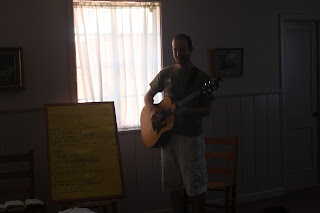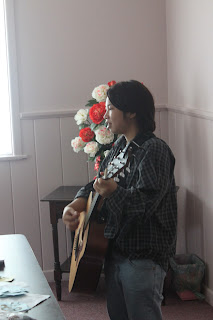I rest my bicycle against the
water tank and gaze out over the meadow, where there were once watermelons and
tomatoes. I suppose if you want to be a gardener you cannot leave the country
for a whole month during the summer. After tilling with the tractor, I set to
work digging a trench around a fifty by fifty foot section and hoeing up wads
of grass. Using twine and sticks, I lay out a path down the middle and several
raised beds. Karen gardeners walk by on their way to pick chilies and plant
daikon radishes in the freshly tilled soil and offer puzzled looks at my tired
face and sticks with string. It is already mid-September and soon it will be
too late to put fall crops in the ground.
“Na ku ra. Na mah ga oh kee gha—You are very hardworking. You will
have two wives!” a voice calls from
down the path.
I look to see Naw Say back from
fishing in the pond and gathering her things to return home for the evening.
“Mayahh? Naw oh ah geh soh, ya bah ma dee ee—Really? There is too
much grass. I have to make a garden like this,” I reply.
I return to forming a second bed
with a hoe and picking out clumps of Bermuda grass. With the daylight fading, I
know that I will not be able to plant seeds yet tonight and resign myself to
finishing the bed.
In the spring I spread seeds
sporadically, too enchanted by the simple mystery that a little particle could
later yield abundant food to plan out beds and such. This seemed to be the way
Naw Say planted as well, without a plan, creating more of a food forest than a
garden. This chaos yielded a bountiful harvest, but always in competition with
encroaching grass, which eventually overtook many of the crops planted.
I cannot plant a fall garden in
this same way. It seems that intentionality is a necessity for effective
agriculture, from crop rotation to weed control. So I will start with setting
aside an area to patrol for grass with designated beds, walking areas, and
mulch. This will be my fortress from which I can wage war against Bermuda
grass.
The word “apocalypse” pervades our
pop-culture as though indicative of the ominous end times, providing the
subject matter for countless Hollywood films and even the occasional less than
historical special on the History channel. The original Greek word refers to an
uncovering, or revelation of something hidden. The early Christian worldview
revolved heavily around this mystery of apocalypse. Living with an apocalyptic
worldview for the early church meant living in an uncovered reality, rejecting
the asserted permanence of empire and the powers that be, and embracing this
fragility as fertile soil for the coming Kingdom of God.
The Karen arriving in the United
States do not know the experience of imperial security, only imperial
persecution. Like the early church, many Karen Christians along the Thai-Burma
border live in tumultuous times, the day and hour unknown when their village or
camp might be massacred, or they might be taken by a third country. Such
instability cultivates a radically different worldview than the average
American, feeling secure with our well established, though certainly not always
agreeable, government, economy, infrastructure, etc.
Karen refugee gardening is shaped
by this experience. Decisions are made promptly and seeds are planted for quick
yields to feed many. As Eh Kaw recently told a reporter from the Athens Banner-Herald,
the Karen planted seeds along their path while fleeing through the jungle,
hoping that others did the same before them. This is gardening for the end
times, embracing the impermanence of the surrounding civilization.
Intentionality here becomes not so much a means of establishing something
permanent, but of preparing for an uncertain future.
Coming from the experience of a
comfortable stability within the empire, I perceive this as chaos. In the
summer I grew very frustrated with the many volunteer tomato and amaranth
plants which Naw Say opposed pulling and yet were shading out the watermelons I
planted. The idea of removing a food producing plant seemed unthinkable to her
even if it would prevent other yields later in the season. Weeding is seldom
practiced among the Karen, because they enjoy many of the wild plants in stir
fry or soup almost as much as the planted vegetables. There is a strange sort
of food security in this agricultural chaos that is difficult for the Western
mind to comprehend. Dale, my herbalist friend, claims that wild plants actually
offer us the most strength and “life force.” “Chickweed will grow up through
pavement. You don’t see garden vegetables doing that.”
With the advent of Food Stamps,
however, more and more processed foods are becoming a part of the daily Karen
diet. As families become more established here, owning their own homes and speaking
fluently the language of America, the Karen gradually transition from survival
mode into a newfound stability. If they are like most other ethnic groups that
have immigrated to the United States, much of their agricultural tradition will
melt away after only a generation or two. The memory of fleeing through the
jungle will fade. Wild plants will become weeds to be pulled from gardens and
trampled on paths.
There is an incredible pride in
the Karen nationality among newly arrived refugees here. The challenge before
community leaders is to preserve this identity as a distinct voice within the
cultural conversation of America. As our politicians speak we can recognize an
empty pride devoid of values and meaning, too drunk on corporate sponsorship to
stand for anything. Among the Karen, there is certainly a different kind of
pride, but what is to keep the empire from crawling in like Bermuda grass and
taking over the garden? Four generations into the experiment, I can say there
are certainly some weeds to pull.



































